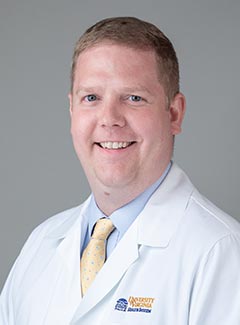
In the United States, more than a quarter of children struggle with allergies. While many of these are mild, symptoms can easily impact quality of life. And for some children, the allergy can cause serious harm.
Pediatric allergy and immunology specialists, like Jonathan Hemler, MD, work to stay at the cutting edge of research and clinical recommendations. In particular, Hemler focuses a great deal of his energy on combating food allergies. His recent research on treating peanut allergy offers hope to countless families dealing with this struggle.
In this Q&A, he shares why he focuses on pediatric allergies and how primary care providers can help their patients.
How can primary care doctors help their patients prevent and treat allergies?
The most important discovery in the food allergy field in the last few years is that early introduction of allergic foods can substantially prevent future allergy. This is the most important thing primary care pediatricians can do for their patients to try to prevent food allergies.
Another condition that many patients suffer from is allergic rhinitis (“seasonal allergies”), and steroid nasal sprays like fluticasone are far and away the best medication to manage this condition as they are much more effective than oral antihistamines. Recommending these nasal sprays would be very helpful to patients in terms of alleviating many of their symptoms.
If young patients have eczema, how should providers and families approach allergic foods?
If children have severe atopic dermatitis (eczema), this is the highest risk factor for developing food allergy. So, it is reasonable to refer these patients to a specialist before introducing allergic foods (the foods most likely to cause allergies).
However, it is completely fine (and I would recommend it!) that families still introduce these foods ASAP since the “earlier the better” it is for preventing food allergy, and counseling families about what symptoms to watch out for in case of an allergic reaction, and the appropriate treatment.
We no longer recommend doing any food testing, including blood testing, for patients who only have atopic dermatitis and no symptoms of immediate reactions to foods. We’ve learned that many children with atopic dermatitis will have false positives on this testing, and it can cause harm, both nutritionally and in terms of developing future allergies, to remove foods from the diet unnecessarily.
What makes specializing in treating pediatric allergies rewarding?
I myself have allergies, so I was interested in the allergy/immunology field early on during my medical training. I fell in love with food allergy during my allergy fellowship training at Vanderbilt, especially since it’s so relevant to my primary residency training in pediatrics. There is a lot of unmet need for patients who have food allergies.
I like being able to focus on just a few allergic conditions and really be an expert in the care that patients and families are seeking, and spending time with them to address all of their concerns.
It allows me to stay as up-to-date as possible on the latest literature and clinical practice, and incorporate this into my practice as needed. I also very much enjoy the longitudinal relationships with my patients and families. I very much enjoy clinical research for food allergy as well.
When should providers refer their patients to your program?
If any patient, particularly a very young patient under 1 year old, has symptoms concerning for an immediate type food allergy, we would want to see them ASAP and get them tested in our clinic. We offer unique therapeutic options for food allergy in our practice at UVA Health Children’s, and the younger we can get these patients started on these therapies, the better their outcomes.
I consider referring providers as part of my team and want to be a resource for them in any way I can.
We offer comprehensive care for all allergic conditions at UVA Health Children’s and, particularly, food allergy in my personal clinical practice. This includes nutrition, psychology, and social work support, as well as unique therapeutic options and clinical research studies that patients would not get the opportunity to participate in at other locations.